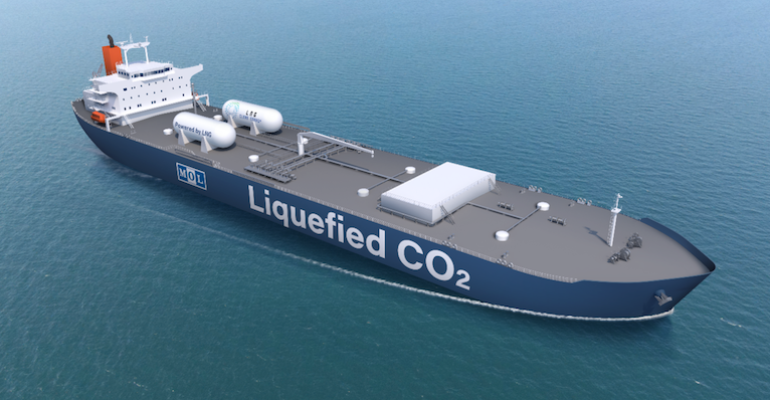The non-profit has awarded to Lloyd’s Register (LR) a concept study into the offloading of liquefied CO₂ captured onboard ships. LR will be assisted by sustainable development collective Arup. The study is expected to take 9 months and started in April 2023.
GCMD said the study addresses a gap in the value chain as carbon capture onboard vessels is likely to be a mid-term solution for decarbonising shipping, and liquefied carbon dioxide (LCO₂) is likely to be a common form of carbon storage, but safety and operational considerations for offloading LCO₂ need to be further explored.
The study will consider the likely scenario that CO₂ offloading takes place at the same time as bunkering and cargo operations, and the operational and safety implications of simultaneous operations.
In the absence of guidelines for offloading capture CO₂, the outcomes of the study will be fed into project REMARCCABLE (Realising Maritime Carbon Capture to demonstrate the Ability to Lower Emissions), a large demonstration of end-to-end shipboard CO₂ capture at scale. The study’s findings will be the basis to enable sea trials under phase three of REMARCCABLE, using an amine-based CO₂ capture system over a 500-hour pilot, aiming to demonstrate 30% annual CO₂ emissions reduction or 1300 kg/hr of CO₂, store 375 metric tonnes of LCO₂ onboard, and offload LCO₂ after 10 days of sailing.
Offloading LCO₂ will rely on landside infrastructure, and so the study will assess the readiness of existing infrastructure for LCO₂ offloading and explore the costs of building and operating LCO₂ handling infrastructure.
“Additionally, a review of existing gaps in analytical methods, verification procedures, competency standards, and regulation regimes that are needed to enable LCO₂ offloading at major ports will be conducted,” said GCMD.
Once the study is complete, its finding will be validated by a series of industry stakeholders across port and terminal operators, vessel owners, and shipyards. The aim of the study is to help support the establishment and development of regulatory guidelines, building towards demonstration and pilot projects for offloading shipboard captured CO₂ as LCO₂.
Professor Lynn Loo, CEO of the Global Centre for Maritime Decarbonisation, said: “We are pleased to be working with Lloyd’s Register on this LCO₂ offloading concept study. The learnings from this study will inform how captured CO₂ can be offloaded from various vessel types in general and enable the sea trials on Stena Impero that are being planned as part of Project REMARCCABLE more specifically.”
Nick Brown, CEO of Lloyd’s Register, said: “This study, in collaboration with stakeholders from across the maritime value chain, will support the establishment of regulatory and operational guidelines around offloading captured liquid carbon dioxide from vessels, which is crucial to enabling safe adoption of carbon capture technologies on board. It will also offer a timely assessment of the capital expenditure and operating expenditure of the infrastructure needed to offload liquid carbon dioxide from ships thus enabling the industry to make informed decisions for creating this infrastructure.”
Borbala Trifunovics, Ports & Maritime Leader at Arup, said “Action on maritime decarbonisation requires innovative new approaches to infrastructure and operations at ports. We are bringing together our maritime and energy expertise to shape solutions for LCO₂ offloading that are safe, efficient and integrated with wider port functions.”
Copyright © 2024. All rights reserved. Seatrade, a trading name of Informa Markets (UK) Limited.
Add Seatrade Maritime News to your Google News feed.  |

